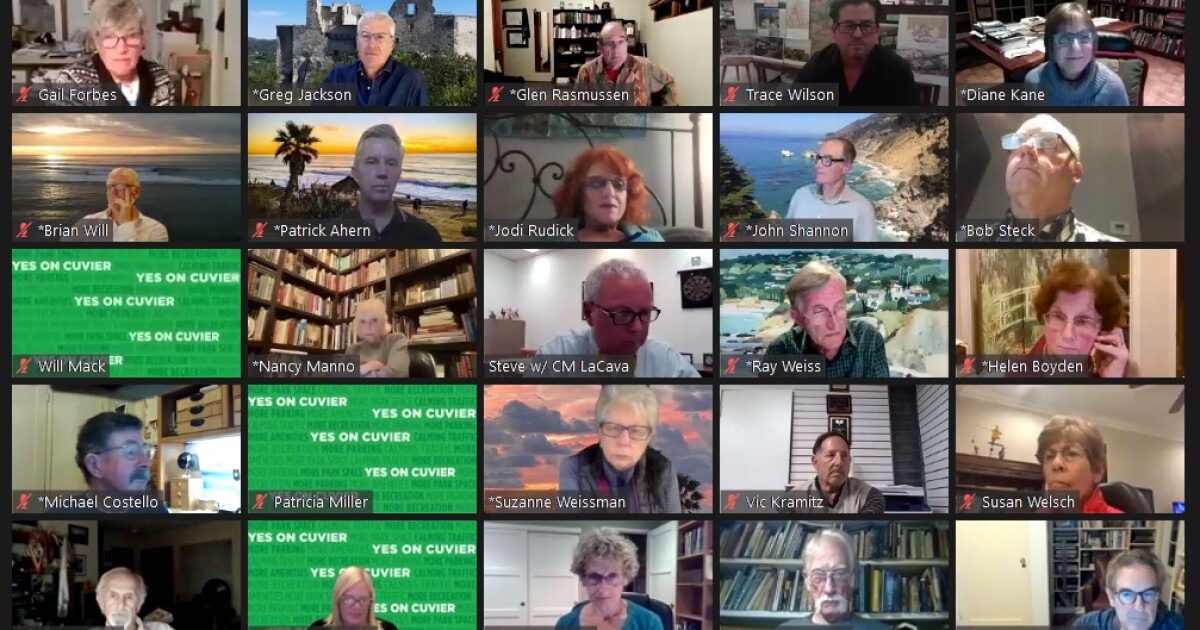
As implementation draws closer for proposed reforms to San Diego’s community planning groups, changes are still being made.
The City Council’s Land Use and Housing Committee heard an update March 10, including that city-provided stipends for planning groups are secured through next fiscal year and that the city would provide other help during the rollout.
The reforms, spearheaded by Councilman Joe LaCava, whose District 1 includes La Jolla, are intended to make community planning groups more independent from the city and more demographically reflective of the areas they represent and to encourage more participation.
However, some of the proposals have ruffled feathers. The La Jolla Community Planning Association has repeatedly spoken against the measures, arguing that they will “kill” community planning groups by adding more work with less support and will be a disincentive for volunteers to run for a seat.
Kathleen Ferrier, LaCava’s policy director, said that under the proposed changes, CPGs would be required to make agendas and documents publicly available in accord with the Brown Act; encouraged to designate seats for community interests such as renters, business representatives and nonprofit organizations; receive less support from city staff; and not be allowed to have meeting attendance requirements for community members interested in voting in annual elections or running for a board seat.
She called the latter a “critical change to remove obstacles for residents to participate in their CPG.”
Among the top concerns raised has been the proposed loss of the city-provided stipend that many groups use to cover the costs of meeting-hosting platforms such as Zoom, printing to post agendas and website administration, Ferrier said.
“We heard loud and clear that CPGs need to continue to receive their stipends,” Ferrier said. She added that continued funding for a stipend was secured through the 2023 fiscal year.
However, community planning groups no longer would have fees waived if they want to appeal a project.
Critics also have argued that CPG board members are not sufficiently trained by the city, and expressed concern with the loss of city support while boards redraft their bylaws to comply with the reforms.
Ferrier said the city would provide training for new board members and a template for required new documentation.
During public comments at the Land Use and Housing Committee meeting, Wally Wulfeck, chairman of the San Diego Community Planners Committee (which includes representatives of each of San Diego’s community planning groups) called the proposed requirements “burdensome and really obnoxious.” But he said the biggest problem is that the plan “severs the relationship between the city and the community planning groups.”
Speakers from University City supported the change that calls for diversity on the boards, saying the makeup of its planning group currently favors homeowners “of a specific demographic,” though renters and students make up a high percentage of the area.
In areas like La Jolla, resident Brenda Fake said, older members of the community usually volunteer for the boards. “We have ... had good leaders in La Jolla. … Could we get more people that are more representative? Yes, but that is a difficult task considering so many retirees do the legwork here.”
Several speakers recommended an attendance requirement of at least one meeting to run for a board seat to ensure that those who participate understand the duties and can commit to a board term.
Committee Chairwoman Vivian Moreno, councilwoman for District 8, said, “The proposed changes are significant … and some are long-standing changes that have needed to be addressed for some time.” But, she said, “every community is different in San Diego.”
In her district, she said, there was an “uneasiness” about the changes. “Some communities have a higher rate of retired professionals that have the time and resources to spend on serving on community planning groups,” she said. “While some have a higher rate of working families who have less of an ability to spend their time running a planning group.”
She suggested strengthening certain language to support current CPGs, and she wanted to see if the city can dedicate resources to CPGs that might need assistance with training and in distributing information.
Moreno also suggested that the CPG stipends be evaluated to make sure they reflect the cost of operations, and that they be given ahead of being used rather than as reimbursement.
LaCava said the suggestions seem “workable” but he would confirm that with the city attorney’s office before committing to them.
In coming months, the reforms will return to the Land Use and Housing Committee for action, followed by possible approval from the full City Council.
CPGs then would have the opportunity to submit their revised bylaws and other documents. The council would host a hearing by the winter to grant recognition to the CPGs that submit the proper paperwork. ◆
"some" - Google News
March 14, 2022 at 06:00AM
https://ift.tt/i9ASmRn
Proposed community planning group reforms get some changes - La Jolla Light
"some" - Google News
https://ift.tt/2p8B6D7
Shoes Man Tutorial
Pos News Update
Meme Update
Korean Entertainment News
Japan News Update
Bagikan Berita Ini














0 Response to "Proposed community planning group reforms get some changes - La Jolla Light"
Post a Comment